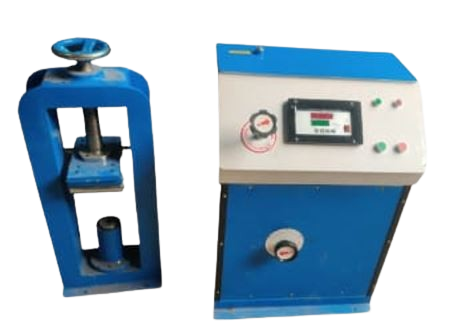- Kh.No 40/A, Gali No. 10, Jeevan Park Siraspur, Libaspur, Delhi-111042
- rishabhlabequipments@gmail.com
- +91 9958441218, 9873511218
Core Cutter With Hammer
A Core Cutter with Hammer is a tool used in geotechnical engineering for the extraction of soil cores from the ground. It's particularly useful for collecting undisturbed soil samples for testing purposes.
A Core Cutter With a Hammer is an essential tool for collecting undisturbed soil samples from various depths in the ground, allowing engineers and geologists to study the soil properties and make informed decisions for engineering projects such as foundations, retaining walls, and embankments.
Hot Air Oven
A Hot Air Oven is a laboratory device used for drying, sterilizing, and heating materials. It operates by circulating hot air evenly throughout the interior chamber, providing a controlled temperature environment for various applications.
Hot Air Ovens are versatile laboratory instruments used in various fields such as microbiology, chemistry, pharmaceuticals, and materials science for drying, sterilizing, and heating a wide range of materials and samples.
Compressor Testing Machine (2000KN) Electrical 3 Gaugue 4 Pillar Model
A Compressor Testing Machine is a device used to evaluate the performance, efficiency, and various parameters of compressors. Compressors are used in various industries for compressing gases or air, and it's crucial to ensure they operate efficiently and reliably.
A Compressor Testing Machine plays a vital role in ensuring the reliability, efficiency, and performance of compressors used in various industrial applications. It allows manufacturers to validate their products, troubleshoot issues, and optimize performance for maximum efficiency and longevity.
Flexure Testing Machine
A Flexure Testing Machine, also known as a flexural testing machine or a bend test machine, is a device used to determine the flexural or bending properties of materials. This testing is crucial for evaluating the strength, stiffness, and deformation characteristics of materials under bending loads.
Flexure Testing Machines are widely used in various industries, including materials science, engineering, construction, and manufacturing, to evaluate the mechanical properties of materials such as metals, plastics, composites, ceramics, and biomaterials. These machines play a crucial role in quality control, research and development, and product design processes.
Compressor Testing Machine(2000KN) Channel Model Digital
A Compressor Testing Machine with a digital channel model incorporates digital technology for enhanced control, monitoring, and data analysis capabilities
A Compressor Testing Machine with a digital channel model leverages digital technology to enhance precision, efficiency, and usability in testing and evaluating compressor performance. It enables more accurate measurement, advanced data analysis, and improved control capabilities compared to traditional analog systems.
CTM 2000KN Power Pack Plate Model
The "CTM 2000KN Power Pack Plate Model" likely refers to a specific type of compression testing machine (CTM) with a capacity of 2000 kilonewtons (KN) and a power pack plate design.
The CTM 2000KN Power Pack Plate Model is designed for testing the compressive strength of materials with a high capacity and incorporates features to ensure accuracy, reliability, and safety during testing operations. It is commonly used in construction, materials testing laboratories, and research facilities for quality control, material characterization, and structural analysis purposes.
Compressor Testing (2000KN Digital) 4 Pillar Model
The "Compressor Testing (2000KN Digital) 4 Pillar Model" likely refers to a specific type of compression testing machine (CTM) designed for testing compressive strength, with a capacity of 2000 kilonewtons (KN), featuring digital control, and adopting a 4-pillar construction design.
The Compressor Testing (2000KN Digital) 4 Pillar Model is a robust and precise compression testing machine suitable for a wide range of materials testing applications, particularly in industries such as construction, materials science, and engineering. It combines high capacity, digital control, and a stable 4-pillar construction design to deliver accurate and reliable test results.
Compressor Testing (1000KN) Manual
The "Compressor Testing (1000KN) Manual" suggests a compression testing machine (CTM) designed for testing compressive strength with a capacity of 1000 kilonewtons (KN) and operated manually rather than digitally.
The Compressor Testing (1000KN) Manual CTM provides a cost-effective solution for basic compression testing needs. While it may lack the advanced features and automation of digital CTMs, it still offers reliable performance and is suitable for applications where manual operation is feasible and cost considerations are important.
Compressor Testing (2000KN Manual) Channel Model
The "Compressor Testing (2000KN Manual) Channel Model" likely refers to a specific type of compression testing machine (CTM) designed for testing compressive strength with a capacity of 2000 kilonewtons (KN), operated manually, and adopting a channel model construction.
The Compressor Testing (2000KN Manual) Channel Model CTM provides a robust and reliable solution for compression testing applications where manual operation is acceptable. Its channel model construction offers structural integrity, while manual operation allows for cost-effective testing without sacrificing accuracy.
Compressor Testing Machine (1000KN) Electrical Analogue
The "Compressor Testing Machine (1000KN) Electrical Analogue" suggests a compression testing machine (CTM) designed for testing compressive strength with a capacity of 1000 kilonewtons (KN), operated through an electrical system, and utilizing analogue instruments for measurement.
The Compressor Testing Machine (1000KN) Electrical Analogue CTM provides a reliable solution for compression testing applications where precise control and analogue instrumentation are sufficient. Its electrical operation allows for consistent and controlled testing, while analogue instruments provide real-time feedback on testing parameters.
Flexure Testing Machine(100KN) Electrical /Digital
A "Flexure Testing Machine (100KN) Electrical" is a specific type of testing equipment designed for evaluating the flexural or bending properties of materials, with a capacity of 100 kilonewtons (KN), and powered by an electrical system.
The Flexure Testing Machine (100KN) Electrical provides a reliable and efficient solution for evaluating the flexural properties of materials in various industries, including manufacturing, construction, aerospace, and research. Its electrical operation, combined with precise control and measurement capabilities, allows for accurate and repeatable testing procedures, ensuring high-quality results.











